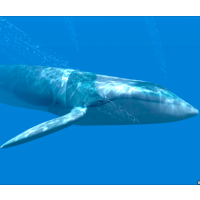Federal Judge Tells Navy to Back off North Coast Sonar Testing Plan

A federal judge ordered that a plan by the U.S. Navy to run sonar training exercises off the coast of California be put on hold while more careful consideration is given to its effect on whales, dolphins, sea lions and other sea creatures.
U.S. District Magistrate Judge Nandor Vadas ruled (pdf) Wednesday that the National Marine Fisheries Service (NMFS) failed to consider the best available science in assessing the effect of sonar on marine mammals. He agreed with environmental groups and local tribes that more up-to-date studies indicate dolphins and whales have “greater susceptibility” to mid-frequency sonar than previously thought, and ordered the NMFS to consider them in reassessing its permit for the Navy.
The NMFS granted the Navy a permit in 2010 to begin five years of anti-submarine warfare training from Mendocino County to the Canadian border. The permit acknowledged that 130,000 marine mammals and other animals would be injured and otherwise inconvenienced. Conservationists argued that research showed noise-induced hearing loss did far more permanent harm than the Navy acknowledged.
The lawsuit was filed last year.
The Navy, which was not a party to the lawsuit, acknowledged to the judge that there were new methods being developed for measuring the impact of explosions on marine life that would probably prove to be more accurate, but argued that the NMFS decision was valid because its information was the “best available data” at the time it looked. The judge disagreed with that reasoning.
Vadas also said the NMFS was wrong to limit its assessment by basing it on the length of the permit, five years, since the Navy planned for the testing to be ongoing.
Steve Mashuda, an Earthjustice attorney representing a coalition of conservation groups and tribes in the case, said, “This is a victory for dozens of protected species of marine mammals, including critically endangered Southern Resident orcas, blue whales, humpback whales, dolphins and porpoises.”
But the “victory” could be short-lived. The decision merely requires the NMFS to reassess its permits and ensure that the Navy activities comply with the Endangered Species Act. That compliance will be open to interpretation. The judge gave the agency 20 days to explain how it would go about making the reassessment.
The court ruling made frequent reference to Hawaii-Southern California training and testing activities, which are being contested by the California Coastal Commission and others. In August, the Navy rejected a plea that it scale back the five-year program of sonar testing that involved underwater detonations.
The Navy said the 50,000 explosions, planned for execution during more than 10,000 hours of high-intensity sonar testing off the Southern California coast, would cause the deaths of only 130 marine animals and impair the hearing of perhaps another 1,600. The Navy characterized the impact as “negligible.”
The animals might just be disturbed, rather than injured or killed, but loud oceans blasts, which are magnified by the water, are known to have significant effects on an animal’s internal navigation system. Some estimates say as many as 5 million marine mammals might suffer from ruptured eardrums and temporary hearing loss.
–Ken Broder
To Learn More:
Environmentalists Win U.S. Court Fight to Protect Whales from Navy Sonar (by Laura Zuckerman, Reuters)
Judge Wants Feds to Reassess Navy Sonar Permits (by Mike Baker, Associated Press)
Agency Ignored Best Science on Sonar, Marine Mammals, Judge Rules (by Tony Barboza, Los Angeles Times)
Court Rules that Federal Agency Failed to Protect Thousands of Whales and Dolphins from Navy Sonar (Earthjustice)
Navy Blows off Coastal Commission Call Not to Use Sonar, Explosives near Whales (by Ken Broder, AllGov California)
InterTribal Sinkyone Wilderness Council et al v. National Marine Fisheries Service, et al (U.S. District Court for the Northern District of California Eureka Division) (pdf)
- Top Stories
- Controversies
- Where is the Money Going?
- California and the Nation
- Appointments and Resignations
- Unusual News
- Latest News
- California Forbids U.S. Immigration Agents from Pretending to be Police
- California Lawmakers Urged to Strip “Self-Dealing” Tax Board of Its Duties
- Big Oil’s Grip on California
- Santa Cruz Police See Homeland Security Betrayal in Use of Gang Roundup as Cover for Immigration Raid
- Oil Companies Face Deadline to Stop Polluting California Groundwater





